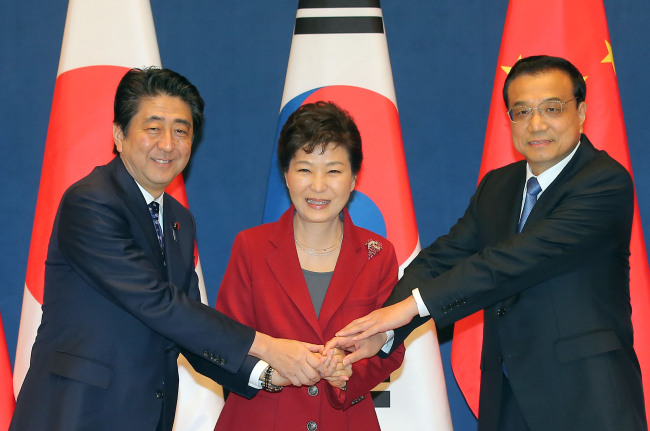 |
| South Korean President Park Geun-hye, Japanese Prime Minister Shinzo Abe (left)and Chinese Premier Li Keqiang hold hands together for a photo before their trilateral summit at Cheong Wa Dae on Sunday. (Yonhap) |
What was initiated as a regular summit in 2008 had been stalled since the fifth summit in May 2012 due to long-festering historical and territorial feuds that have aggravated mutual distrust to the detriment of regional stability.
“Although their economic interdependence has continued to deepen, the three nations’ political relations have been shaky,” said Nam Chang-hee, political science professor at Inha University. “The trilateral meeting helped forge a momentum for narrowing the yawning gap between the economic and political realities.”
South Korean President Park Geun-hye, Japanese Prime Minister Shinzo Abe and Chinese Premier Li Keqiang attended the three-way summit at Cheong Wa Dae, as international attention was being drawn to their talks’ impact on the regional security and economy.
In the absence of the summit, political distrust between Seoul and Tokyo and between Beijing and Tokyo has worsened — a reason calls have been mounting for the three nations to exert more efforts to mend their relations.
Some four months after the last trilateral summit, the Japanese government nationalized the group of disputed islands in the East China Sea, which drew strong protests from China that also claims the islands.
Relations between Seoul and Tokyo were also caught in a downward spiral after former South Korean President Lee Myung-bak paid a surprise visit in August 2012 to Dokdo, Korea’s easternmost islets, which Japan also claims.
Japan’s lack of contrition for its wartime sexual enslavement of Korean women and its repeated sovereignty claim to Dokdo have continued to deepen mutual animosities and hamper bilateral cooperation in a set of areas including deterrence against the North.
Washington has continued to pressure its Asian allies to work closely together to promote regional stability, leading Seoul to exert its diplomacy to persuade Beijing and Tokyo to get together for the trilateral summit in Seoul.
Analysts say that the summit at least helped curb North Korea’s nuclear and missile provocations given that the issue is an exception on which the three nations can present a united position.
“All three parties shared the need to prevent North Korea’s additional provocations that are not in their interests. So cooperation on the North would be one of the tangible achievements,” said Park Won-gon, international relations professor at Handong Global University.
“But the cooperation should not remain just declaratory. The three nations should continue to flesh out their plan for joint efforts to deter North Korea in concrete terms, and Seoul needs to capitalize on the momentum to tackle the North Korean issue.”
The three-way summit also helped ease the impression that Seoul was tilting toward Beijing, as Seoul showed its willingness to improve relations with Tokyo, observers noted.
Since Park visited Beijing to attend a military parade to mark the 70th anniversary of the end of World War II in September, the impression has been growing. But Seoul’s steps to engage with Tokyo and improve three-way security cooperation involving the U.S. helped reduce that impression.
Nam of Inha University said that while Seoul strives to strengthen the trilateral cooperation mechanism involving South Korea, China and Japan, Seoul also needs to enhance three-way cooperation with the U.S. and Japan so as to “balance” the two trilateral relationships.
“There should be a certain level of balance between the Seoul-Beijing-Tokyo partnership and the Seoul-Washington-Tokyo partnership. One should not be pushed for in a way that would damage the other partnership,” he noted.
“So, one plausible way is to propose holding a trilateral summit among South Korea, the U.S. and Japan as well on a regular basis, as South Korea, China and Japan seek to institutionalize their three-way cooperation apparatus.”
By Song Sang-ho (sshluck@heraldcorp.com)

